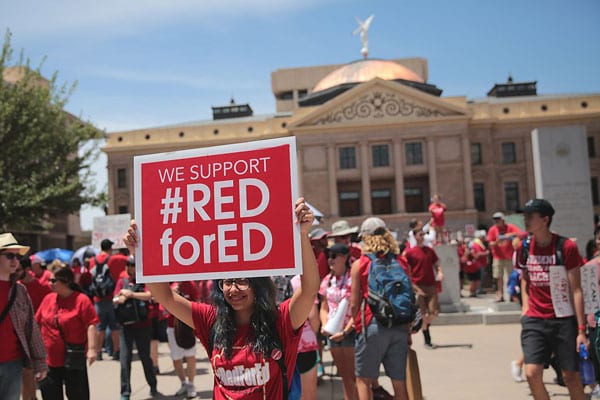
February 14, 2019; Washington Post, Vox, and CNN
“Striking teachers in Denver reached an agreement Thursday with the school system that increases salaries, ending the latest in protests by educators that have swept the nation,” reports Moriah Balingit in the Washington Post. Balingit adds, “The school system agreed to allocate an additional $23 million toward teacher compensation [and] also overhauled the performance pay system, in some cases increasing incentives for teachers while cutting them for central office administrators.”
According to Alexia Fernández Campbell in Vox, “The deal includes an average 11.7 percent pay raise and annual cost of living increases.” How will the Denver public school system pay for the salary increases? Campbell notes, “The district agreed to cut back on administrative costs, and will eliminate about 150 positions in the school’s central office. Five-figure bonuses for senior school administrators will also come to an end.”
As NPQ observed earlier this week, “One key issue behind the dispute concerns a teacher push to increase base pay, in part by reducing performance-based bonuses from ProComp, a program the union believes is ineffective.” According to Campbell, teachers made gains here, too; the system is not ended, but it is altered significantly. The contract “addresses the teachers’ biggest concern: the need to overhaul the merit-pay system, which relies heavily on annual bonuses that fluctuate from year to year. The new system will place more emphasis on education and training when considering promotions, while keeping some bonuses in place.”
The raises will help teachers, but it is understood that the increases they are receiving now build off of a low base. Colorado teachers, Campbell notes, have been “among the lowest-paid in the country, earning an average of $46,155 in 2016—ranking Colorado 46th in average teacher pay, according to the National Education Association. The state also spends about $2,500 less per student each year than the national average. The new deal would boost starting pay for teachers by seven percent, but the average pay raise for all educators, nurses, and counselors will be 11.7 percent.”
Sign up for our free newsletters
Subscribe to NPQ's newsletters to have our top stories delivered directly to your inbox.
By signing up, you agree to our privacy policy and terms of use, and to receive messages from NPQ and our partners.
The gains of the Denver teachers build off of the gains of teachers in Los Angeles last month, and also the broader #RedforEd wave that dates back to last spring—a reality not lost on the striking teachers themselves. For example, Lori Gates, an elementary school teacher, told CNN that:
“My paycheck is going to grow and that’s great, but I really think we are part of the start to this national wave,” she said, also pointing to Los Angeles, where teachers went on strike for six days last month.
Asked what it would be like when she returns to Park Hill Elementary School, Gates said, “We are going to have a lot of hugs. We will talk about (the strike) and talk about having a powerful voice with advocating for yourself.
The Denver strike is now settled, but it may not prove to be the last major teachers’ strike of the season. As NPQ reported earlier this month, in Oakland, California, 84 percent of teachers turned out to vote in the union’s strike authorization election, with 95 percent voting in favor of authorizing a strike. Oakland teachers have worked without a contract for 18 months. They are seeking a 12-percent raise over three years, as well as smaller class sizes, notes local NBC television reporter Melissa Colorado. If the union and administrators fail to reach a settlement, a strike in Oakland could begin by the end of February.—Steve Dubb












